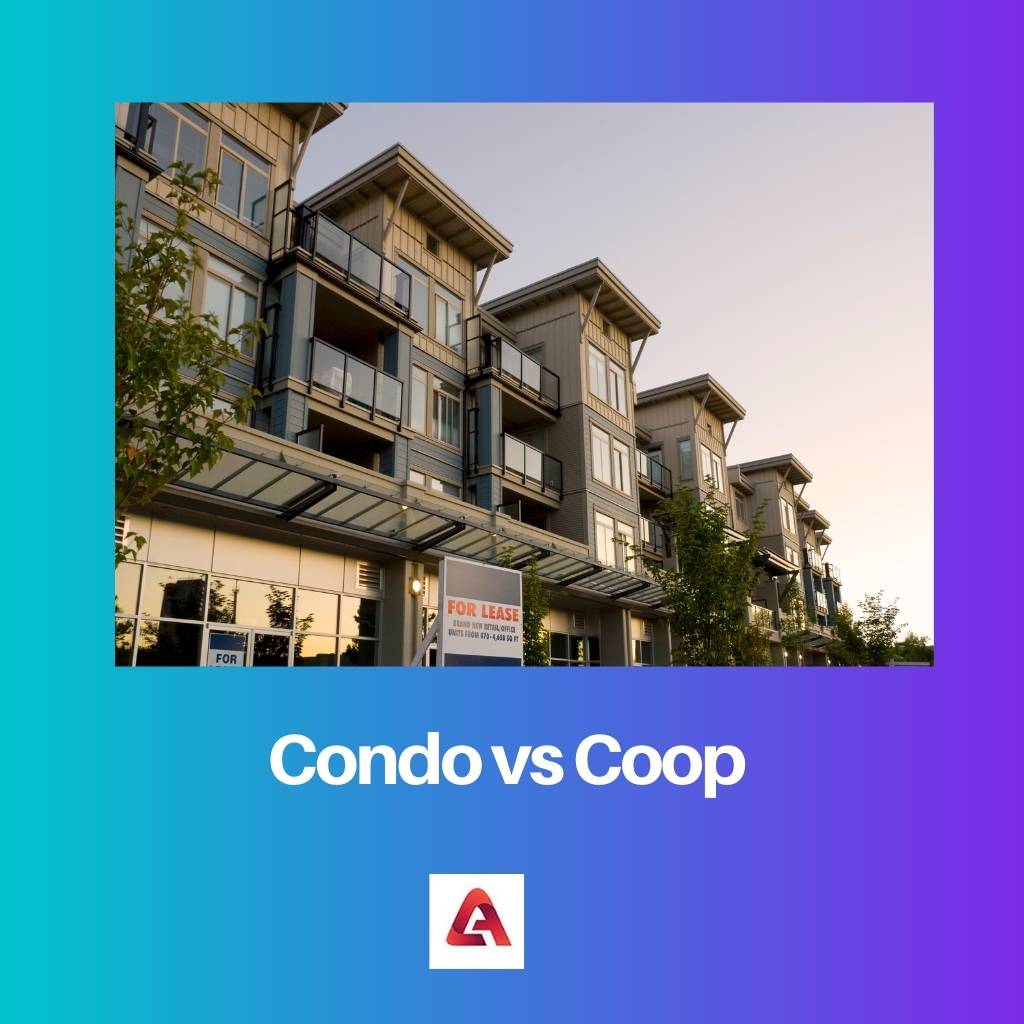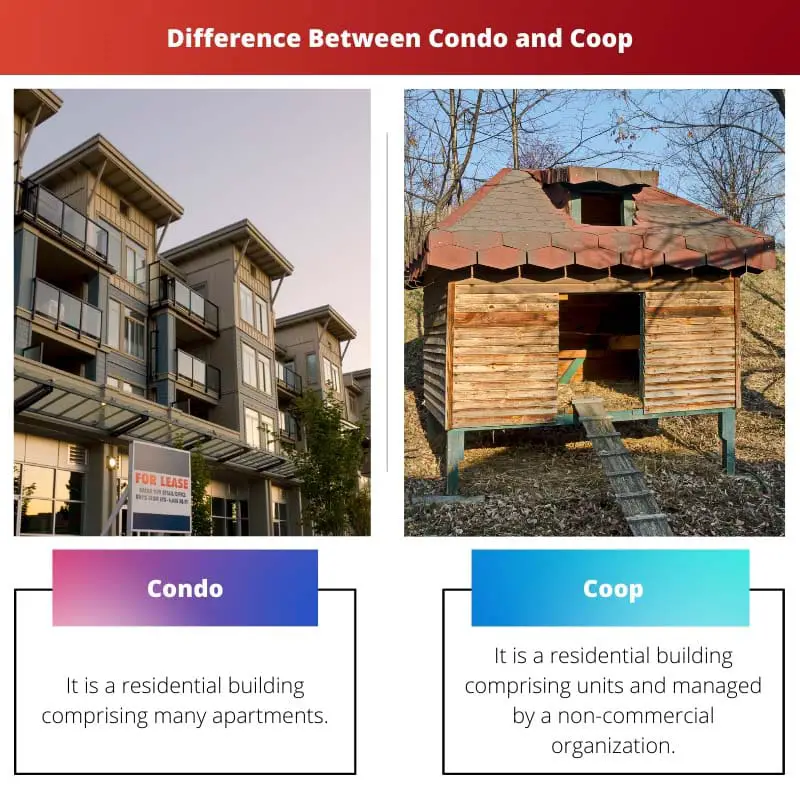There used to be a time when people used to reside in big mansion-type houses that were for them only. The time changed a little bit, and people started living in small houses or rented apartments.
Today, land is rarely available, especially in big cities, and people are required to adjust to buildings that can accommodate multiple residents at one time, such as flats and apartments.
Two very popular forms of residence in such a manner are the Condos and the Coops. These two are widely popular among the people that live in big cities like New York and Washington Etc.
But even after referring to places of residence, these are considerably different from one another.
Key Takeaways
- Condo owners hold individual titles for their units, while co-op residents own shares in the cooperative corporation.
- Condos have more flexible resale and subletting policies compared to co-ops.
- Co-op applicants undergo a stricter approval process, including interviews and financial scrutiny.
Condo vs Coop
People living in a condo have ownership over individual units, while in the case of people living in a co-op, one owns shares of a company that owns the building. A co-op owner doesn’t own the unit himself.

A Condo is also known by another name, Condominium. In simple words, it refers to a building where there are multiple residential units available in the same building, and a variety of people reside inside these units.
Each person owns their particular apartment only and owns the facilities mutually.
But on the contrary, a Coop does not provide you with the opportunity of holding the piece of property.
In other words, if a person is said to buy a coop, it simply implies that he has bought the shares in a particular building or in a particular non-cooperative organization that runs a particular residential building.
Comparison Table
| Parameters of Comparison | Condo | Coop |
|---|---|---|
| Meaning | It is a residential building comprising many apartments. | It is a residential building comprising units and managed by a non-commercial organization. |
| Full name | Condominium | Housing Co-operative |
| Ownership of | It allows the owner of apartments along with mutual ownership of facilities. | It allows ownership of shares in the organization. |
| Taxes | Tax is paid individually for each apartment. | Tax is paid collectively for the whole building. |
| Managed by | All the residents in a mutual yet individual manner. | A board of directors is elected by the residents. |
| Cost | The cost will include a certain percentage of maintenance cost for the building. | The cost will include everything from maintenance costs to repair chargers, etc. |
What is Condo?
A very popular word used in place of the condo is a condominium, and it is a very popular kind of residence, especially in the United States.
Defining it in simple words, it can be termed as a basic building in which multiple apartments are present.
When a person buys a condo, it means that he is buying a specific apartment in the building, and he is responsible for the ownership and maintenance of that apartment.
However, in certain cases, this responsibility can extend to a person with respect to the whole building, as a condo is less like a commercial building and more like a mutual society.
So, for such concerns, sometimes the cost for a condo includes the maintenance charges for the building as well.
When a person owns a condo, he does not only own his particular apartment but also owns certain facilities mutually with the other residents. These facilities include things like a swimming pool, elevators, a garden, a parking lot, etc.
In other words, it can be an apartment and can be used with the term apartment interchangeably.

What is Coop?
Coop is a short word that stands for a housing cooperative. Unlike the other forms of residence, this refers to a particular building in which apartments are there.
Still, the people who live inside those apartments do not own their specific apartments. Rather they own the shares in the interest of that particular building.
These shares are issued by a non-commercial organization that consists of all the residents of the society.
In the proportion in which each person has the shares for that building, they are said to pay the cost.
This cost might include the maintenance charge, the housing text, and other emergency funds, which may be used in the case of a certain contingency.
One drawback is that the person does not get the ownership of his apartment, but he gets the ownership of the shares. However, this allows him to get a say whenever something significant happens related to the building.
This type of building is said to be suitable for those who are ready to make connections with their neighbours because, due to being cooperative, a person cannot expect to reside individually and cut off contact with other residents.

Main Differences Between Condo and Coop
- Owning a condo will amount to owning a complete apartment while owning a Coop will only amount to owning a share in the building.
- In a Condo, the house tax is paid individually by each person residing in each apartment, while in a Coop, all the people compile their funds together and then pay a collective house tax.
- The full name for Condo is Condominium, while for Coop, it is Housing Cooperative.
- Condo allows the ownership of apartments along with mutual ownership of facilities. But Coop does not allow any such thing.
- In a Condo, the management is done by all the residents in a collective manner, but in a Coop, a complete body of directors exists that takes decisions after getting suggestions from every resident.

- https://arc-riverdale.com/wp-content/uploads/2014/12/Choosing-Between-a-Co-op-and-a-Condo-NYTimes.com_.pdf
- https://elibrary.ru/item.asp?id=6100313

The ownership model and cost implications of condo and coop living are important factors for prospective residents to evaluate. This article provides a well-rounded perspective on both.
Absolutely, the understanding of ownership and costs is crucial in making the right housing decision.
The management structure and tax implications of condo and coop living are important aspects to consider. This article provides a comprehensive overview.
I couldn’t agree more. The management structure and tax differences play a significant role in the decision-making process.
Absolutely, understanding these nuances is crucial when evaluating condo and coop living.
The distinguishing features between condos and coops are effectively presented in this article. It’s a valuable resource for anyone considering these housing options.
Absolutely, the clear distinctions outlined here are beneficial for potential buyers in making an informed choice.
The concept of community management in coops is intriguing, especially for those who value shared decision-making. This article presents a balanced view of both housing options.
I completely agree. The community management aspect is worth considering for those seeking a collaborative living environment.
This article effectively outlines the basic differences between condos and coops, making it easier for potential buyers to weigh their options.
Definitely, the detailed comparison table adds clarity to the decision-making process for those considering condo or coop living.
I agree, having a clear understanding of the differences is essential for informed decision-making.
The tax implications for condos and coops are an important consideration for potential buyers. This article does a great job of explaining these differences.
Absolutely, understanding the tax implications is crucial in making an informed decision about housing options.
Both condo and coop have their pros and cons, and the choice between the two really depends on a person’s lifestyle and priorities. Interesting article!
I completely agree. The decision should be well-informed and carefully considered.
Absolutely! It’s important that buyers understand the key differences before making a decision.
The distinction between condo ownership and coop shares is well highlighted in this article. It’s a helpful guide for anyone exploring real estate options.
Absolutely, the information presented here is valuable for anyone navigating the real estate market.
I completely agree. The clear explanation of differences makes it easier to consider the best fit for one’s needs.
Both condos and coops offer unique ownership structures. Prospective buyers need to carefully assess their preferences and lifestyle before making a decision.
Well said. It’s important for buyers to align their housing choice with their long-term lifestyle and financial goals.
The stringent approval process for co-ops is certainly a significant factor when comparing the two types of residence. It’s not just about owning a home but also about community living.
Absolutely, the sense of community and shared responsibility is unique to co-ops and can be very rewarding for the right individuals.
Well said! The aspect of community living and shared responsibility is something to take into account.